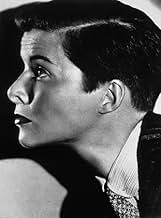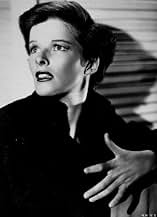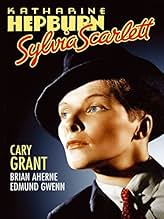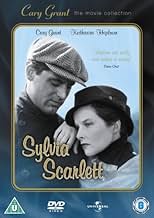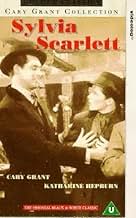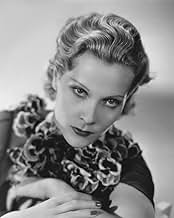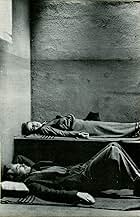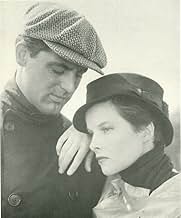IMDb RATING
6.2/10
4.6K
YOUR RATING
When her father decides to flee to England, young Sylvia Scarlett must become Sylvester Scarlett and protect her father every step of the way, with the questionable help of plenty others.When her father decides to flee to England, young Sylvia Scarlett must become Sylvester Scarlett and protect her father every step of the way, with the questionable help of plenty others.When her father decides to flee to England, young Sylvia Scarlett must become Sylvester Scarlett and protect her father every step of the way, with the questionable help of plenty others.
Robert Adair
- Turnkey
- (uncredited)
Bunny Beatty
- Maid
- (uncredited)
May Beatty
- Older Woman on Ship
- (uncredited)
Daisy Belmore
- Fat Woman on Beach
- (uncredited)
Carmen Beretta
- Woman
- (uncredited)
Nina Borget
- Minor Role
- (uncredited)
Thomas Braidon
- Minor Role
- (uncredited)
Elsa Buchanan
- Minor Role
- (uncredited)
Colin Campbell
- Minor Role
- (uncredited)
James Carlisle
- Park Scam Onlooker
- (uncredited)
Patricia Caron
- Minor Role
- (uncredited)
Harold Cheevers
- Bobby
- (uncredited)
E.E. Clive
- Customs Inspector
- (uncredited)
Edward Cooper
- Customs Inspector
- (uncredited)
Storyline
Did you know
- TriviaAfter a disastrous preview, director George Cukor and Katharine Hepburn went to RKO producer Pandro S. Berman's home and offered their services for free for another film. Berman, who was furious at the quality of the movie, replied tersely, "Don't bother, please."
- GoofsWhen Sylvester yells for a cop outside the mansion, Henry gets left outside. Jimmy opens the door and pulls Henry in roughly. In doing so, Henry loses a shoe. Inside the mansion, Henry has both shoes, never having retrieved his shoe from outside.
- Quotes
Sylvia Scarlett: Well, we're all fools sometimes. Only you choose such awkward times.
- ConnectionsFeatured in The Men Who Made the Movies: George Cukor (1973)
- SoundtracksHello ! Hello ! Who's your Lady Friend ?
(uncredited)
Music by Harry Fragson
Lyrics by Worton David and Bert Lee (1914)
Sung by Cary Grant and Edmund Gwenn
Featured review
eh.
You can't really love this picture, to be honest, though I really do want to love anything with Hepburn. In fact, this was the first time I ever caught myself thinking she'd put in a second-rate performance, but that's arguable - some will say that her boyishness actually was well done, and I can't entirely disagree with that.
The truth is that this movie is bursting with melodramatic affectation, and that is rather off-putting to us who are so used to the post-Brando state of character representation. We have to believe that the actor IS the character for the whole thing (writing, characterization, acting, everything) to be a success. If we are embarrassed by what we perceive as a bad performance, the whole thing's in danger of being embarrassing. Now I am no expert on 30s cinema, but I have seen a lot of this kind of thing originating from that decade and I kind of reckon it was the expected style of performance, still left-over from the silent days when body language was all a performer had. Knowing what Hepburn would be capable of bringing later, I think it can't be that she relied on the melodrama like a crutch - instead it's my feeling that she was too easily by Cukor's direction, since many of the other cast members act similarly.
The script is also weak, as it relies on the audience using their imagination far too much in order to fill in the gaps we assume exist in the novel. A good writer/director team will indicate passage of time more fluidly than this; we are left with a lurching sensation, like weeks or months have passed for the characters but not for us, and some might even be confused by the sudden shift of action. If it hadn't been for this clumsiness, I would have given the picture another star for scope.
The film gets the five stars I gave it for Cary Grant's performance, which is one of the best of his career, a superb, well rounded job, and of course it is good enough to deserve a recommendation for the film, even if everything else about it was not-so-good.
The truth is that this movie is bursting with melodramatic affectation, and that is rather off-putting to us who are so used to the post-Brando state of character representation. We have to believe that the actor IS the character for the whole thing (writing, characterization, acting, everything) to be a success. If we are embarrassed by what we perceive as a bad performance, the whole thing's in danger of being embarrassing. Now I am no expert on 30s cinema, but I have seen a lot of this kind of thing originating from that decade and I kind of reckon it was the expected style of performance, still left-over from the silent days when body language was all a performer had. Knowing what Hepburn would be capable of bringing later, I think it can't be that she relied on the melodrama like a crutch - instead it's my feeling that she was too easily by Cukor's direction, since many of the other cast members act similarly.
The script is also weak, as it relies on the audience using their imagination far too much in order to fill in the gaps we assume exist in the novel. A good writer/director team will indicate passage of time more fluidly than this; we are left with a lurching sensation, like weeks or months have passed for the characters but not for us, and some might even be confused by the sudden shift of action. If it hadn't been for this clumsiness, I would have given the picture another star for scope.
The film gets the five stars I gave it for Cary Grant's performance, which is one of the best of his career, a superb, well rounded job, and of course it is good enough to deserve a recommendation for the film, even if everything else about it was not-so-good.
- zygimantas
- Oct 4, 2005
- Permalink
- How long is Sylvia Scarlett?Powered by Alexa
Details
Box office
- Budget
- $641,000 (estimated)
- Runtime1 hour 35 minutes
- Color
- Aspect ratio
- 1.37 : 1
Contribute to this page
Suggest an edit or add missing content


